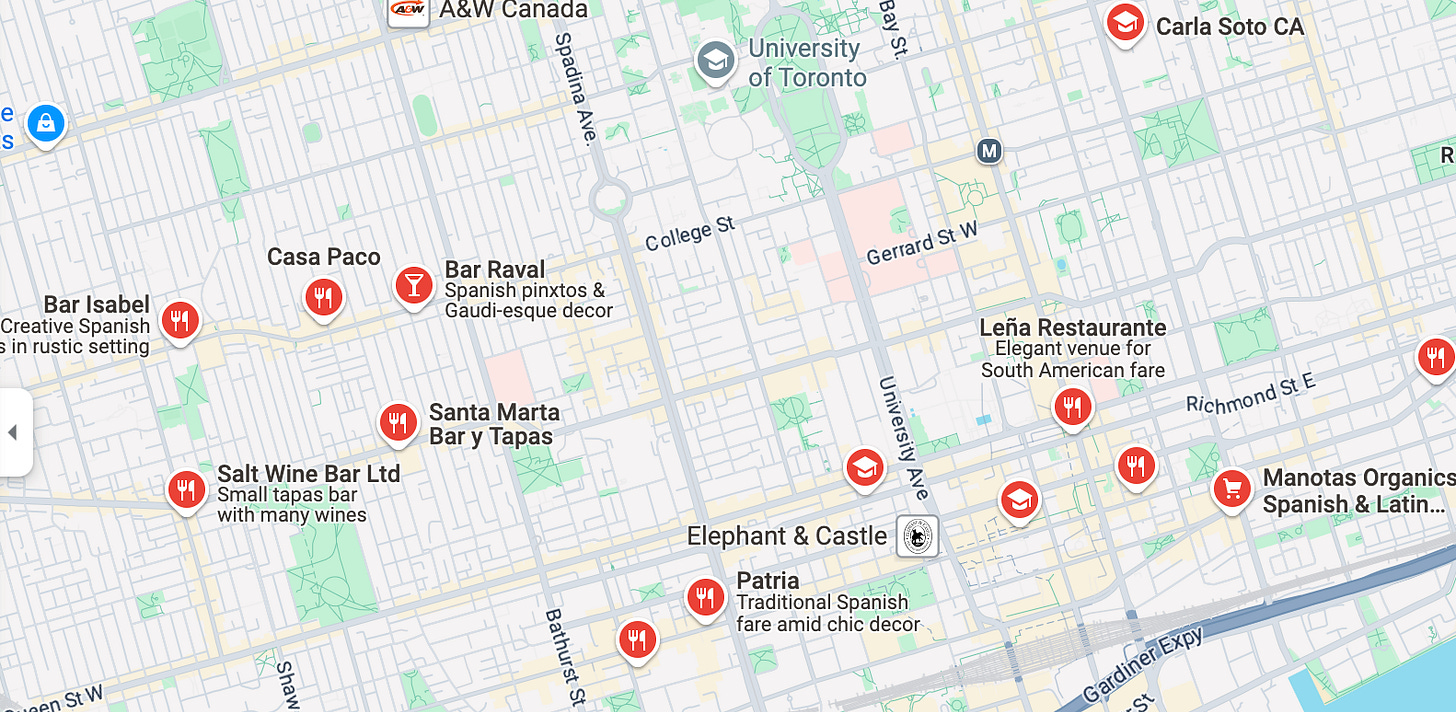Ditching reviews & searches 🏃♀️💨⭐️
How algorithms mess with our tastes + Toronto’s top eats, according to my subjective opinion. 😋
Foreword
Welcome back to a new edition of Jen Z Issues! It’s been a while since my last post. Over the past few months, life has leaned a bit heavily on the "policy" side (I mean, doing Internet governance and Canadian public policy simultaneously is fun but a lot), so I took a break from this newsletter to avoid putting out something random and to prevent further burnout from policy analysis.
Since starting this Substack, I promised myself not to use this platform merely as a venting outlet, but to offer constructive solutions through the “random sh*t” we encounter in everyday life. In the past, I’ve used everyday moments as entry points for policy analysis. While those articles might have helped make policy more accessible and enjoyable, in hindsight, they may have been too long or boring at times, so it feels like the right time to switch things up.
Going forward, I’ll experiment with different writing styles for my "policy talk" or "issues talk," and, most importantly, I’ll focus on turning “random sh*t” into constructive ideas, if not full solutions. Hopefully, this will help us strike the right balance of meaningful and fun ideas to reignite this newsletter.
👀 Sneak peek: Today’s rant is all about how online reviews and Google search results are messing with the quality of food adventures in Toronto. Plus, how some underrated local gems might be getting lost in the shuffle. And, of course, I’ll top it off with my totally subjective picks for the best eats in the city.
“Researching” for the best
I used to have a habit of “researching” food options like it was a PhD thesis. If I had plans with friends the next evening, I absolutely had to spend a solid chunk of time tracking down the perfect spot—at least 36 hours in advance, of course. My two go-to sources: (1) the ever-expanding list of “nice” restaurants I meticulously curated from Instagram feeds, and (2) an intense Googling session to analyze every bit of data available for all possible options.
This highly data-driven approach served me well for a while—until I ventured into an Asian-pan-Latin fusion restaurant on Ossington (restaurant name censored 🙊). For context, this highly acclaimed spot was recommended by an acquaintance, and naturally, I “validated” it by checking their glowing reviews online. I mean, they had a 4.5 rating on Google and a solid 5.0 rating on Yelp. Plus, it was endorsed by someone I know. What could possibly go wrong, right?
Going in with such high expectations, it completely shattered my understanding of how Shanghai bok choy could have the texture of mashed potatoes, and how the taste of tilapia could be so overpowering that it felt like I’d devoured an entire fish market. I’d love to give it a second chance, but I couldn’t muster the courage (or the budget 💸) to endure another round of overpriced disappointment.
It was quite a classic example of expectation mismatch ⚖️, and obviously not a pleasant personal experience. Though it didn’t push me to leave a scathing review on the spot (which, in hindsight, I probably should have exercised my right to inform future diners, right?) , it did make me seriously reconsider how much faith I should put in online reviews and Google search results going forward.
More fiction than fact
Most people skim online reviews before trying a new restaurant, and some end up relying on them like they’re seeking validation from a panel of strangers before committing to a meal. It’s practically a ritual at this point if you rely on reviewers you don’t even know to rubber-stamp your choice without a second thought!
Yet, online reviews barely capture reality for multiple reasons. For one, restaurants, if done the right business decision, should be located in the demographics they cater to, and that will have some level of influence in how they judge their experience. Some groups are just more generous with their positive comments, while others are just more prone to “complaining.” You can ask any of my Cantonese-speaking aunties about that; their highest form of praise for my beloved triple-layered spongy strawberry shortcake with the most refreshing whipped cream from Dessert Lady Cafe & Bakery is either “not bad” or “not too sweet”, which is the gold standard of compliments.
Leaving a review is never a “mandatory” part of a dining experience, meaning restaurants end up with a random grab bag of feedback from various demographics, which makes reviews as data pretty much incomparable. At the end of the day, reviews are just personal opinions, and opinions, by nature, are subjective. There’s a whole spectrum of what’s considered good or bad, and it’s all deeply influenced by individual taste. And taste, being pure personal preference, is never going to be objective. People can rant or rave about something based entirely on their own experiences or disappointments–there's nothing right or wrong about that.
Just another numbers game?
On top of that, location 📍 plays a huge role in the quantity and quality of reviews a restaurant receives––a mediocre spot in a bustling neighborhood might rack up tons of reviews (positive or negative) while a hidden gem in a quieter area barely gets a blip on the radar. This discrepancy happens because organic foot traffic and local demographics shape the odds of someone actually leaving a review, which in turn influences how prominently a restaurant appears in your search results.
That being said, if you are a first-timer to Toronto Googling recommendations to curb your craving for Pho (a kind of Vietnamese noodle soup 😋), you’re probably going to be directed to some “popular” spots on Spadina Avenue, a.k.a. Chinatown, as shown in the screenshot below. Chances are you will never get to discover how absurdly tasty the shredded pork vermicelli and delicious beef broth at Pho Linh are, unless you already know about this place or happen to be around College and Dufferin, where the restaurant is more likely to rank higher in your search results due to proximity.
P.S. Pho Linh isn’t even shown in this screenshot because it’s way beyond where people without prior knowledge of the local neighbourhood would typically venture.
Some restaurants, often corporate-run, also have far more resources to game their Search Engine Optimization (SEO) for better online presence. Their websites are all sleek, mobile-friendly, and perfectly keyword-optimized, so when you search for a cute date spot, I somehow always end up at these shiny, overhyped, and pretentious places that scream "Insta-worthy,” but not necessarily "tasty."
They may even have more resources to incentivize customers to leave glowing reviews, which are often artificial and lacking genuine diversity of perspective yet heavily influence a restaurant’s ranking in search results––more specifically, Google search results, because with 90% of the online search market, Google practically owns the show. They even pay companies like Apple billions to be the default search engine in Safari to ensure that you get to see only the “best” options Google recommends––it’s a numbers game, not a gourmet contest!
Top-ranked ≠ always the best
Despite Google knowing all my preferences and practically being my alter-ego, there are moments when its personalized search results fall short (👀 see screenshot below), especially when I’m craving a true taste of Spain. Don’t get me wrong, these Spanish restaurants are great, and I’ve enjoyed dining at many of them. But this particular search for something to satisfy my longing for that faraway place made it clear: just because a place ranks high doesn’t mean it’s truly the “best.”
For instance, Bar Raval has a lively vibe with its Gaudi-inspired decor and a stand-up bar serving legit pintxo-sized dishes (but it’s pricey); Salt Wine Bar has a very generous portion but when you’re aiming for tapas, bigger isn’t always better (though the wine selection is quite nice); Bar Isabel is a lovely, upscale spot that serves delicious and creative dishes, but you’ll need to bring enough cash and plan way ahead for a reservation; and Patria feels far too “fancy” to be called “traditional”––it’s like that friend who comes back from “Bar-th-elona” raving about their love for Spain, even though they’ve only visited one Catalan city and never made it to Madrid, let alone Andalusia.
After two years of searching, I unexpectedly stumbled upon a hidden gem––Tapas at Embrujo in Danforth––without the help of searches or reviews. This restaurant stands out not only with the taste, quality, and presentation of its food but also with the tablao-style flamenco show they put on every Friday and Saturday. While I think this truly authentic tapas spot represents Spanish food in Toronto quite well, I was surprised to see that it wasn’t packed on a typical Friday night and only holds a 4.0 rating on Google reviews. This feels like one of those classic restaurant stories where a place gets overlooked for failing to modernize and compete with its more commercialized rivals. Worst of all, it might meet the same fate as Ein-Stein Cafe & Pub––a beloved student haunt for generations that has become just a distant memory.
Epilogue
Ever since I accepted that online reviews are just opinions—worse yet, they could be “fake”––and that algorithms, driven by Big Tech's profit motives, can be totally biased, I ditched the idea of relying on these unnecessarily tech-heavy ways to “guide” my personal experiences, like sharing a breakfast sandwich on a French bistro table with my boyfriend by the window at Janelle’s Kitchen, or savouring a homemade-style Gamjatang (Korean pork bone soup) with friends and family on a chilly morning at Imonay. Abandoning the algorithm has made food adventures fun again!
Now, I’m not here to make you feel pessimistic about the internet (it’s already challenging enough, and negativity doesn’t help 🤷). There are policy solutions out there, like how the U.S. Federal Trade Commission bans fake reviews and testimonials, and I believe competition reform is needed in the (way too monopolized) online search market, where ads dominate search results. But we, as consumers, also have the power to make a difference. Supporting local restaurants by thoughtfully choosing where to spend our hard-earned money is one of the most direct and delicious ways to help! 💖
(Disclaimer: This article is just me showing love to some of my favorite spots—I hope you’ll enjoy them too! 🙃 Got a hidden gem of your own? Tell me what makes it special!)







